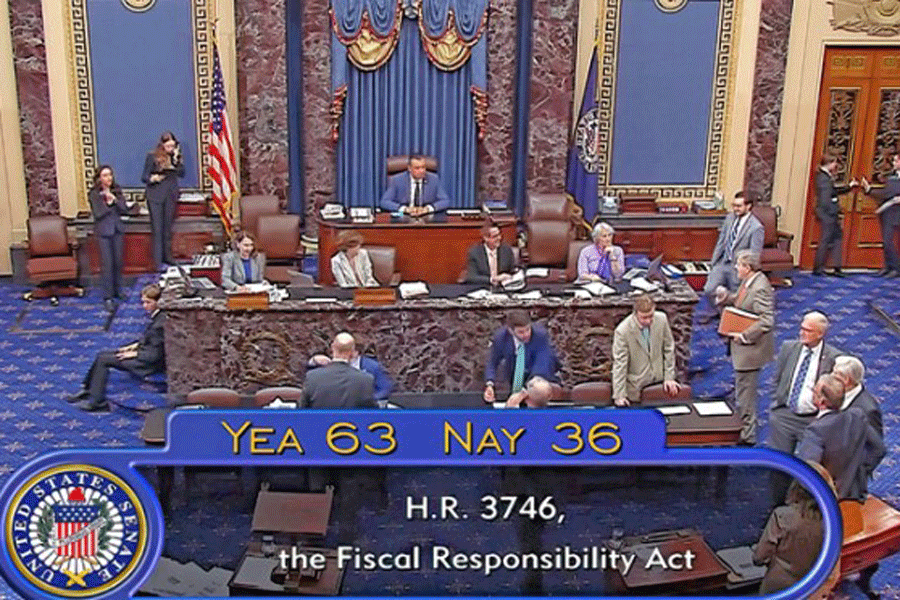The US Senate on Thursday passed bipartisan legislation backed by President Joe Biden that lifts the government’s $31.4 trillion debt ceiling, averting what would have been a first-ever default. The Senate voted 63-36 to approve the bill that had been passed on Wednesday by the US House of Representatives as lawmakers raced against the clock following months of partisan bickering between Democrats and Republicans.
The immediate impact on markets is that the dollar has started to weaken against several currencies as the deal dented the greenback’s safe-haven appeal.
On Friday, the rupee hardened against the dollar, and the 10-year bond yield remained below 10 per cent.
The Dollar Index (DXY), which gauges the greenback’s strength against a basket of six currencies, was trading at 103.67 on Friday against the previous close of 103.56. It had settled at 104.25 on May 29.
The rupee gained 10 paise against the dollar as the greenback remained under pressure in the global markets. The currency settled at 82.31 against its previous close of 82.41 to the dollar, with market participants also attributing the gain to strong portfolio inflows.
Stock impact
The passage of the legislation in the US generated a wave of optimism across the world markets and increased the appetite for risky assets. In India, the benchmark Sensex rose 118.57 points to close at 62547.11 after two days of weakness. Sentiment was buoyed by signs the Fed will skip a rate hike at its next meeting.
Philadelphia Fed President Patrick Harker said on Thursday “it’s time to at least hit the stop button for one meeting and see how it goes”, referring to the June 13-14 Fed meeting.
A day earlier, US Fed governor Philip Jefferson said “skipping a rate hike at a coming meeting would allow the committee to see more data before making decisions about the extent of additional policy firming”.
At the bond market, yields on the benchmark 10-year security ended flat at 6.98 per cent against the previous close of 6.97 per cent. This is for the third straight session that the yield (which moves in opposite direction to prices) is trading below the 7 per cent mark. Traders said that the softness is due to expectations that the Reserve Bank of India (RBI) will hold the policy repo rate again next week at 6.50 per cent.
They, however, added that supply of government securities due to its borrowing programme will cap any major gains in G-Sec prices. For now, the 10-year bond is seen consolidating at the current levels till the RBI announces its decision next Thursday..
“The approval of a debt deal that prevented a US default instilled optimism among global investors, who are now eagerly awaiting the Federal Reserve’s forthcoming monetary plan.
"Although the higher-than-anticipated US inflation initially raised concerns about another interest rate increase by the Fed, these fears were short-lived as Fed officials indicated a potential rate hike deferral in June. Contrary to the global trend, domestic indicators favour bullish sentiment,’’ Vinod Nair, head of research at Geojit Financial Services, said.
There was more good news for equities on Friday evening as data released by the US Bureau of Labor Statistics (BLS) showed non-farm payrolls rising 339,000 in May which was far higher than the expectation of 190,000. However, at the same time, the US unemployment rate also rose to 3.7 per cent from 3.4 per cent in the previous month.
The data led to a rally in US stock prices with the Dow Jones Industrial Average trading higher by 371 points at the time of writing this report. Analysts said that the data (strong job addition) indicated that the US economy is unlikely to slip into recession.










